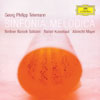Telemann Sinfonia Melodica
When modern playing meets historical awareness they make a fine couple
View record and artist detailsRecord and Artist Details
Composer or Director: Georg Philipp Telemann
Genre:
Orchestral
Label: Deutsche Grammophon
Magazine Review Date: 3/2006
Media Format: CD or Download
Media Runtime: 55
Mastering:
Stereo
DDD
Catalogue Number: 477 5923

Tracks:
| Composition | Artist Credit |
|---|---|
| Concerto for Violin, Strings and Basso Continuo |
Georg Philipp Telemann, Composer
Berlin Baroque Soloists Georg Philipp Telemann, Composer Rainer Kussmaul, Violin |
| Concerto for Oboe, Strings and Basso Continuo |
Georg Philipp Telemann, Composer
Albrecht Mayer, Oboe Berlin Baroque Soloists Georg Philipp Telemann, Composer Rainer Kussmaul, Violin |
| Concerto for Strings and Continuo |
Georg Philipp Telemann, Composer
Berlin Baroque Soloists Georg Philipp Telemann, Composer Rainer Kussmaul, Violin |
| Concerto for 2 Violins, Strings and Basso Continuo |
Georg Philipp Telemann, Composer
Berlin Baroque Soloists Georg Philipp Telemann, Composer Rainer Kussmaul, Violin Rüdiger Liebermann, Violin |
| Suite, 'Sinfonia melodica' for 2 Oboes and Strings |
Georg Philipp Telemann, Composer
Albrecht Mayer, Oboe Berlin Baroque Soloists Georg Philipp Telemann, Composer Rainer Kussmaul, Violin |
| Overture for 2 Oboes, Violin, Bassoon, Strings and Basso Continuo |
Georg Philipp Telemann, Composer
Albrecht Mayer, Oboe Berlin Baroque Soloists Georg Philipp Telemann, Composer Rainer Kussmaul, Violin |
Author: Richard Lawrence
This is a follow-up to ‘Concertos – Unknown Works’ by Telemann that the Berlin Baroque Soloists made for EMI (3/02), and it’s an absolute charmer. Note that it isn’t on DG’s Archiv label: this is not a period-instrument band but a flexible ensemble of players moonlighting from the Berlin Philharmonic, no less.
The Overture and the Concerto for violin and strings, TWV51:E3, have been reconstructed by Raimar Orlovsky, one of the players. The Overture consists of a single movement, three slow sections enclosing two fast ones which include solos for violin and oboes and some catchy alternations of duple and triple metre. The booklet-note is vague as to whether this movement was intended to stand alone and equally uninformative concerning the amount of editorial work necessary for the violin concerto. Never mind: from the forthright opening in the strings and the soloist’s arpeggio response, the playing of the concerto has a wonderful vitality. I particularly liked the way the tutti charge towards the end of a phrase. The central Adagio is a siciliano for violin and continuo, and the finale an exuberant Allegro with much passagework across the strings, brilliantly played by Rainer Kussmaul.
Albrecht Mayer spins an elegant line in the Andante of the ‘fragmentary’ oboe concerto, accompanied by an obsessive, ticking figure in the violins. If the two-violin concerto has an Italianate first movement, with its sequences and chains of thirds, there’s a combination of Italian and French characteristics in the Sinfonia melodica, whose Menuet en Rondeau is nicely pointed, with light repeated triplets from the oboe. In fact, lightness – of touch, not of content – best sums up this disc: one that shows a perfect blend of ‘modern’ playing with ‘historical’ awareness.
The Overture and the Concerto for violin and strings, TWV51:E3, have been reconstructed by Raimar Orlovsky, one of the players. The Overture consists of a single movement, three slow sections enclosing two fast ones which include solos for violin and oboes and some catchy alternations of duple and triple metre. The booklet-note is vague as to whether this movement was intended to stand alone and equally uninformative concerning the amount of editorial work necessary for the violin concerto. Never mind: from the forthright opening in the strings and the soloist’s arpeggio response, the playing of the concerto has a wonderful vitality. I particularly liked the way the tutti charge towards the end of a phrase. The central Adagio is a siciliano for violin and continuo, and the finale an exuberant Allegro with much passagework across the strings, brilliantly played by Rainer Kussmaul.
Albrecht Mayer spins an elegant line in the Andante of the ‘fragmentary’ oboe concerto, accompanied by an obsessive, ticking figure in the violins. If the two-violin concerto has an Italianate first movement, with its sequences and chains of thirds, there’s a combination of Italian and French characteristics in the Sinfonia melodica, whose Menuet en Rondeau is nicely pointed, with light repeated triplets from the oboe. In fact, lightness – of touch, not of content – best sums up this disc: one that shows a perfect blend of ‘modern’ playing with ‘historical’ awareness.
Discover the world's largest classical music catalogue with Presto Music.

Gramophone Digital Club
- Digital Edition
- Digital Archive
- Reviews Database
- Full website access
From £8.75 / month
Subscribe
Gramophone Full Club
- Print Edition
- Digital Edition
- Digital Archive
- Reviews Database
- Full website access
From £11.00 / month
Subscribe
If you are a library, university or other organisation that would be interested in an institutional subscription to Gramophone please click here for further information.




